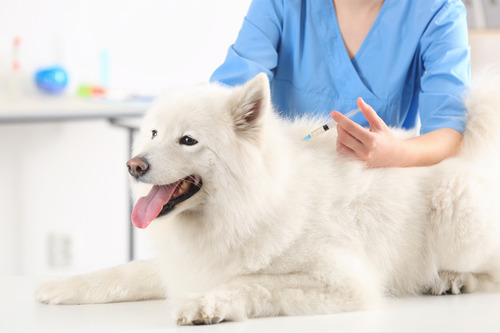Vaccinations are an essential part of keeping your dog healthy, but sometimes they can cause side effects. One reaction is shaking or trembling, which can be concerning for pet owners. In this article, we’ll explore why dogs might shake after getting a vaccine, what you should do, and when you should contact a veterinarian.
Why Is My Dog Shaking After a Vaccine?
After receiving a vaccine, your dog’s body is working hard to build immunity against various diseases. This process can sometimes lead to mild side effects. Shaking or trembling is one such side effect and can occur for several reasons:
- Mild Discomfort or Pain: The injection site might be a bit sore, causing your dog to shake.
- Stress or Anxiety: The visit to the vet and the vaccination itself can be stressful, leading to shaking.
- Fever: Some dogs develop a low-grade fever after vaccination, which can cause shivering.
- Mild Allergic Reaction: A slight allergic reaction can cause your dog to feel unwell and shake.
- Normal Immune Response: The shaking could be part of your dog’s immune response to the vaccine.
It’s important to monitor your dog closely after they receive a vaccine. While mild shaking is usually not a cause for alarm, there are certain signs you should watch for.
When Should I Be Concerned?
While mild shaking after a vaccine is generally harmless, it’s important to recognize when it might indicate a more serious issue. Here are some signs that you should contact your veterinarian:
Prolonged Shaking
If your dog continues to shake for more than a few hours after receiving the vaccine, it could be a sign of a more serious reaction. Persistent shaking warrants a call to your vet.
Severe Allergic Reactions
Although rare, severe allergic reactions to vaccines can occur. Symptoms include:
- Swelling of the face, muzzle, or throat
- Difficulty breathing
- Vomiting or diarrhea
- Hives or intense itching
- Weakness or collapse
If you notice any of these symptoms, seek veterinary care immediately.
Behavioral Changes
If your dog seems excessively lethargic, disoriented, or shows other unusual behavior, it’s best to consult with your vet. These could be signs that your dog is having a more significant reaction to the vaccine.
How to Care for Your Dog After a Vaccine
To help your dog feel more comfortable after getting a vaccine, you can take a few simple steps at home. Here’s what you can do:
- Provide a Comfortable Space: Ensure your dog has a quiet, comfortable place to rest. A familiar environment can help reduce stress and allow them to recover more quickly.
- Monitor for Additional Symptoms: Keep an eye on your dog for any new or worsening symptoms. Note any changes in their behavior, appetite, or physical condition, and report these to your veterinarian if they occur.
- Offer Gentle Reassurance: Spend time with your dog, offering gentle petting and reassurance. Your presence can be calming and help them feel more secure.
- Follow Vet Instructions: If your veterinarian has provided any specific post-vaccination care instructions, be sure to follow them closely. This might include administering medications or monitoring specific symptoms.
Common Vaccination Side Effects
It’s helpful to know what other side effects might occur after your dog receives a vaccine. Some common side effects include:
- Mild fever
- Lethargy
- Reduced appetite
- Soreness at injection site
These side effects usually resolve on their own within a couple of days. If they persist or worsen, contact your veterinarian for advice.
What Vaccines Do Dogs Commonly Receive?
Understanding the vaccines your dog receives can help you be more informed about potential reactions. Common vaccines include:
Rabies Vaccine
The rabies vaccine is essential for all dogs and is required by law in many areas. It protects against the rabies virus, which is fatal and can be transmitted to humans.
Distemper, Adenovirus, Parvovirus (DAP) Vaccine
This combination vaccine protects against three serious diseases: distemper, adenovirus, and parvovirus. It’s often given in a series of shots when dogs are puppies and followed by boosters throughout their life.
Bordetella Vaccine
The Bordetella vaccine helps prevent kennel cough, a highly contagious respiratory disease. It’s particularly important for dogs that spend time in boarding facilities, dog parks, or grooming salons.
When to Schedule Your Dog’s Next Vaccination
Vaccinations are a critical part of your dog’s health care routine, but they need to be scheduled appropriately to ensure maximum effectiveness. Most vaccines require booster shots to maintain immunity. Here’s a general guide:
Puppy Vaccination Schedule
Puppies typically receive their first set of vaccinations at 6-8 weeks of age, followed by additional shots every 3-4 weeks until they are 16-20 weeks old. This schedule helps build their immune system during their most vulnerable period.
Adult Dog Vaccination Schedule
After the initial puppy series, adult dogs need booster shots at regular intervals. Your veterinarian will provide a schedule based on your dog’s age, health, and lifestyle. Generally, boosters are given every 1-3 years.
Caring for Your Dog Post-Vaccination
Understanding why your dog might shake after getting a vaccine and knowing how to care for them can help you feel more confident and prepared. Always monitor your dog after vaccinations, and don’t hesitate to contact World of Animals Veterinary Hospital if you have any concerns. Our team is here to support you and ensure your pet stays healthy and happy. To schedule an appointment or discuss any concerns, please contact us today.





